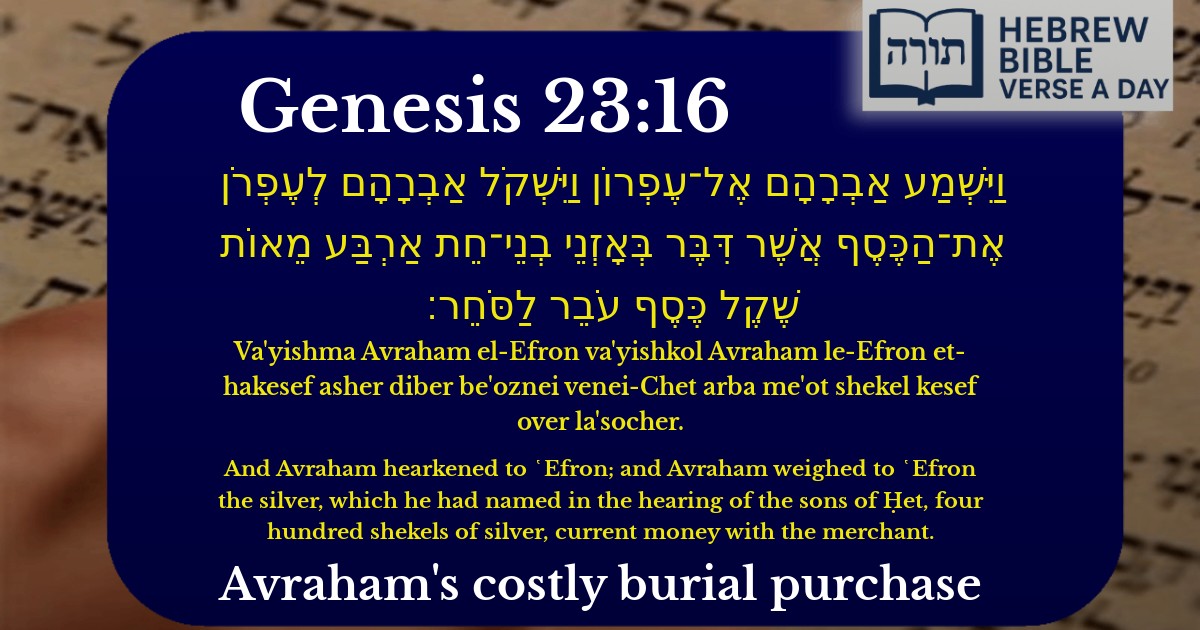Join Our Newsletter To Be Informed When New Videos Are Posted
Join the thousands of fellow Studends who rely on our videos to learn how to read the bible in Hebrew for free!
Hebrew Text
וַיִּשְׁמַע אַבְרָהָם אֶל־עֶפְרוֹן וַיִּשְׁקֹל אַבְרָהָם לְעֶפְרֹן אֶת־הַכֶּסֶף אֲשֶׁר דִּבֶּר בְּאָזְנֵי בְנֵי־חֵת אַרְבַּע מֵאוֹת שֶׁקֶל כֶּסֶף עֹבֵר לַסֹּחֵר׃
English Translation
And Avraham hearkened to ῾Efron; and Avraham weighed to ῾Efron the silver, which he had named in the hearing of the sons of Ḥet, four hundred shekels of silver, current money with the merchant.
Transliteration
Va'yishma Avraham el-Efron va'yishkol Avraham le-Efron et-hakesef asher diber be'oznei venei-Chet arba me'ot shekel kesef over la'socher.
Hebrew Leining Text
וַיִּשְׁמַ֣ע אַבְרָהָם֮ אֶל־עֶפְרוֹן֒ וַיִּשְׁקֹ֤ל אַבְרָהָם֙ לְעֶפְרֹ֔ן אֶת־הַכֶּ֕סֶף אֲשֶׁ֥ר דִּבֶּ֖ר בְּאׇזְנֵ֣י בְנֵי־חֵ֑ת אַרְבַּ֤ע מֵאוֹת֙ שֶׁ֣קֶל כֶּ֔סֶף עֹבֵ֖ר לַסֹּחֵֽר׃
וַיִּשְׁמַ֣ע אַבְרָהָם֮ אֶל־עֶפְרוֹן֒ וַיִּשְׁקֹ֤ל אַבְרָהָם֙ לְעֶפְרֹ֔ן אֶת־הַכֶּ֕סֶף אֲשֶׁ֥ר דִּבֶּ֖ר בְּאׇזְנֵ֣י בְנֵי־חֵ֑ת אַרְבַּ֤ע מֵאוֹת֙ שֶׁ֣קֶל כֶּ֔סֶף עֹבֵ֖ר לַסֹּחֵֽר׃
🎵 Listen to leining
Parasha Commentary
📚 Talmud Citations
This verse is quoted in the Talmud.
📖 Bava Metzia 87a
The verse is referenced in a discussion about the legal implications of transactions and the importance of witnesses in monetary matters, illustrating how Abraham's purchase of the cave of Machpelah was conducted publicly and with proper procedure.
📖 Sanhedrin 111a
The verse is mentioned in a discussion about the righteousness of Abraham and his meticulousness in fulfilling legal and ethical obligations, even in financial transactions.


Context of the Transaction
The verse (Bereishit 23:16) describes Avraham Avinu's purchase of the Cave of Machpelah from Efron the Hittite to bury Sarah Imeinu. This transaction is significant as it represents the first acquisition of land in Eretz Yisrael by the Avot, establishing a permanent Jewish connection to the land.
Rashi's Explanation of "Shekel Kesef Over LaSoher"
Rashi explains that the term "shekel kesef over laSoher" (current money with the merchant) refers to coinage that was widely accepted in commerce, not provincial or debased currency. This underscores the fairness of the transaction, as Avraham paid full value with universally recognized currency.
The Significance of 400 Shekels
Halachic Implications of the Transaction
The Talmud (Bava Metzia 87a) derives from this episode that business transactions should be conducted publicly before witnesses ("b'oznei bnei Chet"), establishing an important principle in Jewish monetary law about transparency in commerce.
Avraham's Conduct as a Model
Kli Yakar emphasizes that Avraham insisted on paying full price despite Efron's initial offer to give the land for free (23:11). This teaches the importance of avoiding even the appearance of exploiting others' generosity, especially when dealing with those outside the covenant.